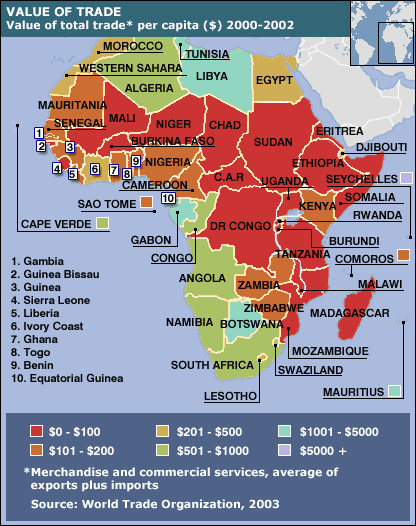Poverty
Africa is a key theme of this year's G8 summit. This is an overview of some of the economic challenges facing the continent.
Most of Sub-Saharan Africa is in the World Bank's lowest income category of less than $765 Gross National Income (GNI) per person per year. Ethiopia and Burundi are the worst off with just $90 GNI per person.
Even middle income countries like Gabon and Botswana have sizeable sections of the population living in poverty.
North Africa generally fares better than Sub-Saharan Africa. Here, the economies are more stable, trade and tourism are relatively high and Aids is less prevalent.
Development campaigners are urging the G8 to reform the rules on debt, aid and trade to help lift more African nations out of poverty.
Debt
The Heavily Indebted Poor Countries initiative (HIPC) was set up in 1996 to reduce the debt of the poorest countries.
Poor countries are eligible for the scheme if they face unsustainable debt that cannot be reduced by traditional methods. They also have to agree to follow certain policies of good governance as defined by the World Bank and the IMF.
Once these are established the country is at "decision point" and the amount of debt relief is established.
Critics of the scheme say the parameters are too strict and more countries should be eligible for HIPC debt relief.
This map shows how much "decision point" HIPC countries spend on repaying debts and interest.
Fourteen African HIPC countries will have their debts totally written off under a new plan drawn up by the G8 finance ministers.
Aid
Africa receives about a third of the total aid given by governments around the world, according to the Organisation for Economic Co-operation and Development.
Much of this has conditions attached, meaning governments must implement certain policies to receive the aid or must spend the money on goods and services from the donor country.
The World Bank, which is reviewing its conditionality policies, argues that aid is far more effective, and less vulnerable to corruption, when coupled with improved governance.
There was a sharp drop in rich countries' relative spending on aid in the late 1990s.
The Make Poverty History campaign is urging the G8 to raise an extra $50bn more in aid per year and to enforce earlier pledges for developed countries to give 0.7% of their annual GDP in aid.
Trade
Africa is rich in natural resources such as minerals, timber and oil, but trade with the rest of the world is often difficult.
Factors include poor infrastructure, government instability, corruption and the impact of Aids on the population of working age.
Poorer countries and agencies such as Oxfam also argue that international trade rules are unfair and favour the developed world.
They say rich countries "dump" subsidised products on developing nations by undercutting local producers.
And they accuse the World Trade Organisation (WTO) of forcing developing nations to open their markets to the rest of the World but failing to lower rich countries' tariff barriers in return.
But the WTO says that low income countries receive special treatment, including exemption from some regulations that apply to richer nations.